AstraZeneca vaccine change for Delta outbreak
There have been recent changes to advice for Australians facing the Delta outbreak who have not been vaccinated yet. Find out how it affects you.
Adults under the age of 60 who cannot access the Pfizer Covid-19 vaccine should be able to receive the AstraZeneca jab instead if they are in a Delta variant outbreak zone, health authorities say.
The Australian Technical Advisory Group on Immunisation said in a statement on Tuesday that its recommendations for non-outbreak settings were unchanged.
“In the context of a Covid-19 outbreak where the supply of Comirnaty (Pfizer) is constrained, adults younger than 60 years old, who do not have immediate access to Comirnaty (Pfizer), should reassess the benefits to them and their contacts from being vaccinated with Covid-19 vaccine AstraZeneca, versus the rare risk of a serious side effect,” ATAGI said.
While the recommended interval between the two doses of AstraZeneca was between four and 12 weeks, during outbreaks it should be between four and eight weeks, the group added.
“Therefore, people in an outbreak situation who received their first dose of Covid-19 vaccine AstraZeneca more than four weeks ago should contact their vaccine provider to arrange their second dose as soon as possible,” they said.
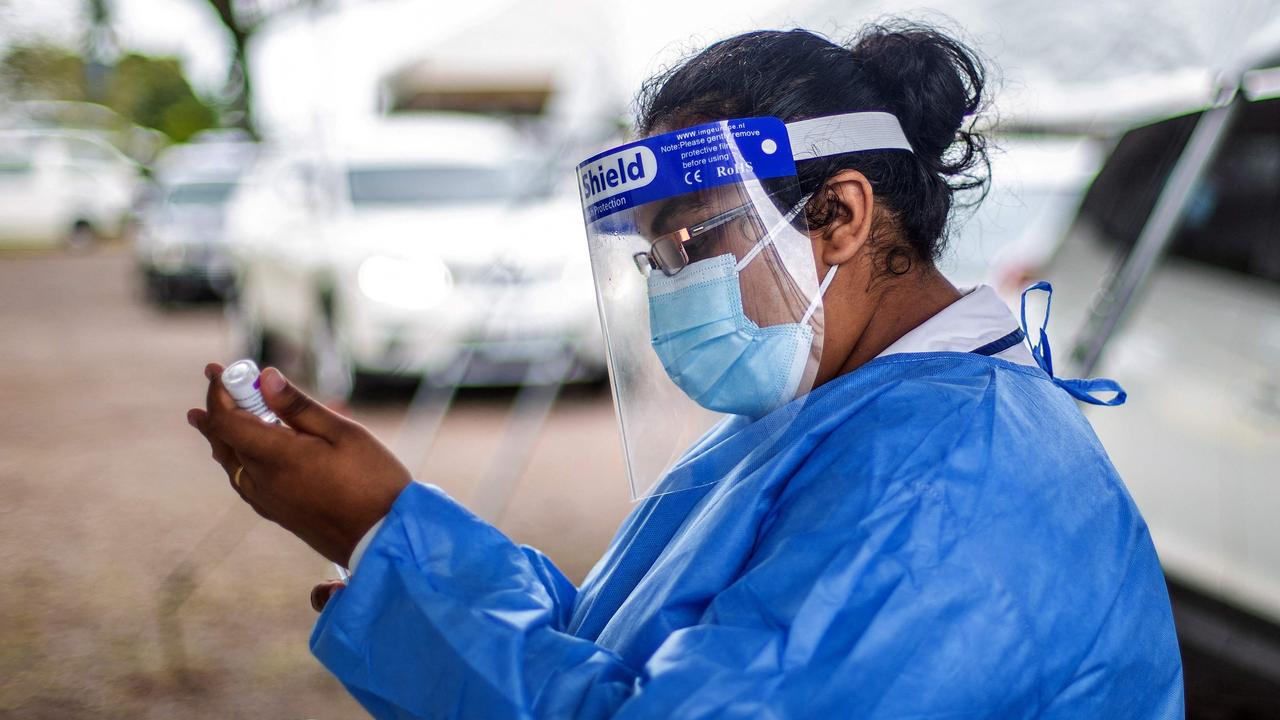
In non-outbreak situations, the preferred interval between doses of the AstraZeneca vaccine remains at 12 weeks.
Recommendations about the use of the Pfizer vaccine remain unchanged in all settings.
ATAGI said in outbreaks, such as the one in Sydney, the benefits of vaccination were greater.
The experts said the current cumulative risk of the virus for Sydney residents to July 11 was about 10 per 100,000 and was increasing by two more cases per 100,000 every day.
“Although overall this is comparable to the Australian first wave (cumulative incidence 29 per 100,000), the ongoing risk would be considerably greater in some parts of Sydney and for specific populations,” ATAGI said.
For example, it said the in Fairfield local government area, the cumulative risk was greater than 100 per 100,000 and had increased by more than 10 cases per 100,000 each day in the past week.
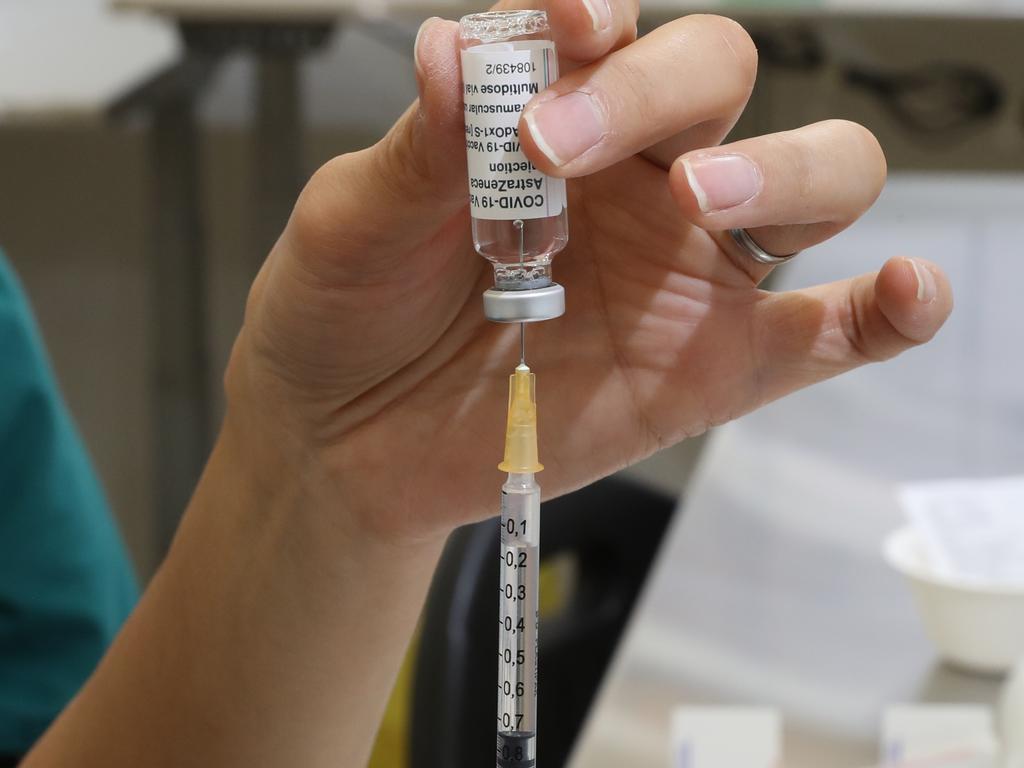
ATAGI reiterated that the benefits of the AstraZeneca vaccine strongly outweighed the risks of adverse effects in people over the age of 60.
The group said all people who received the AstraZeneca jab should be provided with information about common and rare, but serious, side effects including thrombocytopenia syndrome.
“They should be advised that if they experience any signs or symptoms consistent with TTS, they should seek immediate medical attention,” ATAGI said.
Additional unallocated supplies of the Pfizer and AstraZeneca vaccines should be prioritised to populations and areas of greatest risk, the experts added.
It’s the rare side effect that has derailed and delayed Australia’ Covid-19 vaccine rollout – TTS blood clots or thrombosis with thrombocytopenia syndrome.
One in every 65,000 people who get the AstraZeneca vaccine are at risk of developing the clots and the risk of death is a tiny one in 2.5 million.
TTS appears to be far more rare (1.7 cases per million doses.) following second doses of the AstraZeneca vaccine but as of yet no-one in Australia has developed it after the second jab.
The good news is 52 people who suffered the condition have been discharged from hospital, and late last week 22 were still in hospital including six who were in ICU.
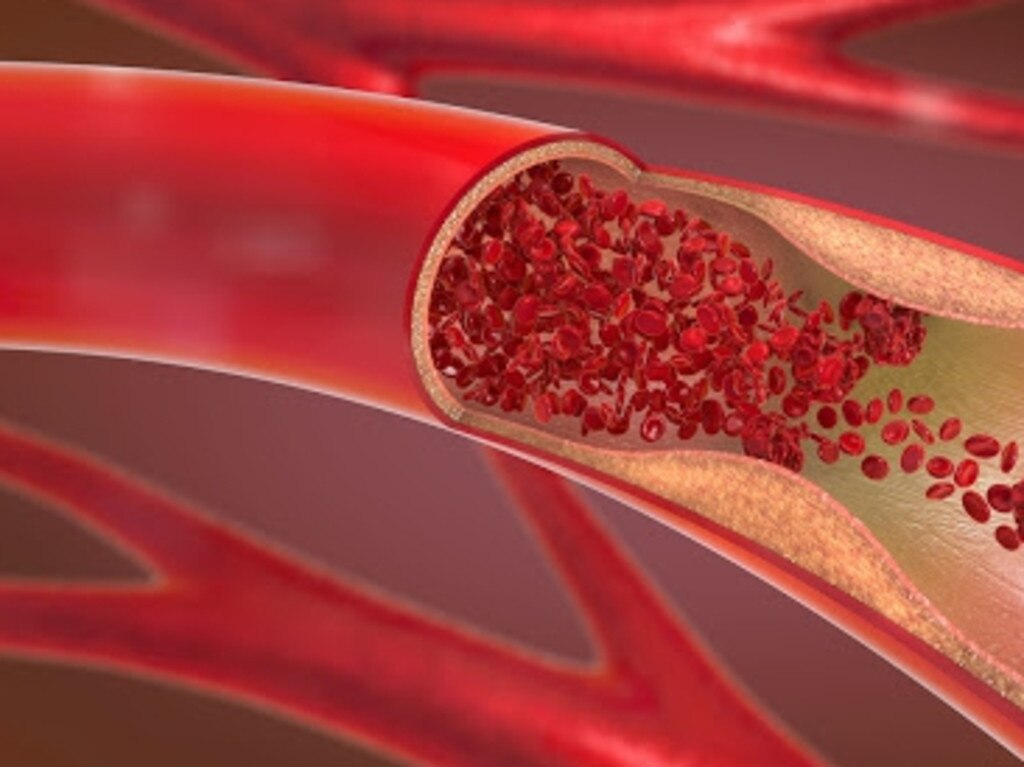
The Medical Journal Australia reported the first known case of TTS in Australia was in a 44 year old male health worker who required two abdominal surgeries after developing the condition eight days after vaccination, he spent 34 days in hospital.
Since then Australia’s doctors have become better at detecting the syndrome and an effective treatment protocol has been developed.
Here we talk you through the TTS condition, how to spot it, how it’s treated and how small the risk actually is.
What is TTS?
TTS is short for thrombosis with thrombocytopenia syndrome a rare blood clotting condition that has been linked to AstraZeneca’s Covid-19 vaccine.
The condition causes thrombosis (blood clotting) which prevents blood flowing normally through the body.
It also causes thrombocytopenia, a condition in which a person has a low blood platelet count. Platelets are blood cells that help blood clot and they stop bleeding by clumping and forming plugs in blood vessel injuries.
The blood clots can occur at different parts of the body, including the brain and in the abdomen and the legs.
The low level of blood platelets can potentially cause bleeding.
The head of Australia’s medicines watchdog the Therapeutic Goods Administration Professor John Skerritt said it’s thought the condition is brought on by a wayward immune response to AstraZeneca’s COVID-19 vaccine.
“People who have had other blood clots have no risk increased risk, it’s not associated with whether you have had clots before or whether you’re on anti- coagulants or platelet medicines or whether you’ve had a cardiac stent or a stroke,” Professor Skerritt said.
There is a very small group of people with clotting disorders who should get an alternative COVID-19 vaccine these include people with:
. A past history of cerebral venous sinus thrombosis (CVST)
. A past history of heparin-induced thrombocytopenia (HIT)
. A past history of idiopathic splanchnic (mesenteric, portal and splenic) venous thrombosis
. Anti-phospholipid syndrome with thrombosis
What are the symptoms?
Symptoms include persistent headache, unusual bruising or tiny red spots beyond the vaccination site, blurred vision, fainting or loss of consciousness, loss of movement in parts of the body, or coma, persistent abdominal pain, a cold feeling in the leg or a swelling in the leg, shortness of breath, chest pain.
These typically appear four to 30 days after the vaccination.
It’s worth remembering COVID-19 itself causes thrombocytopenia in around four in 10 people and up to 95 per cent of those with severe disease.
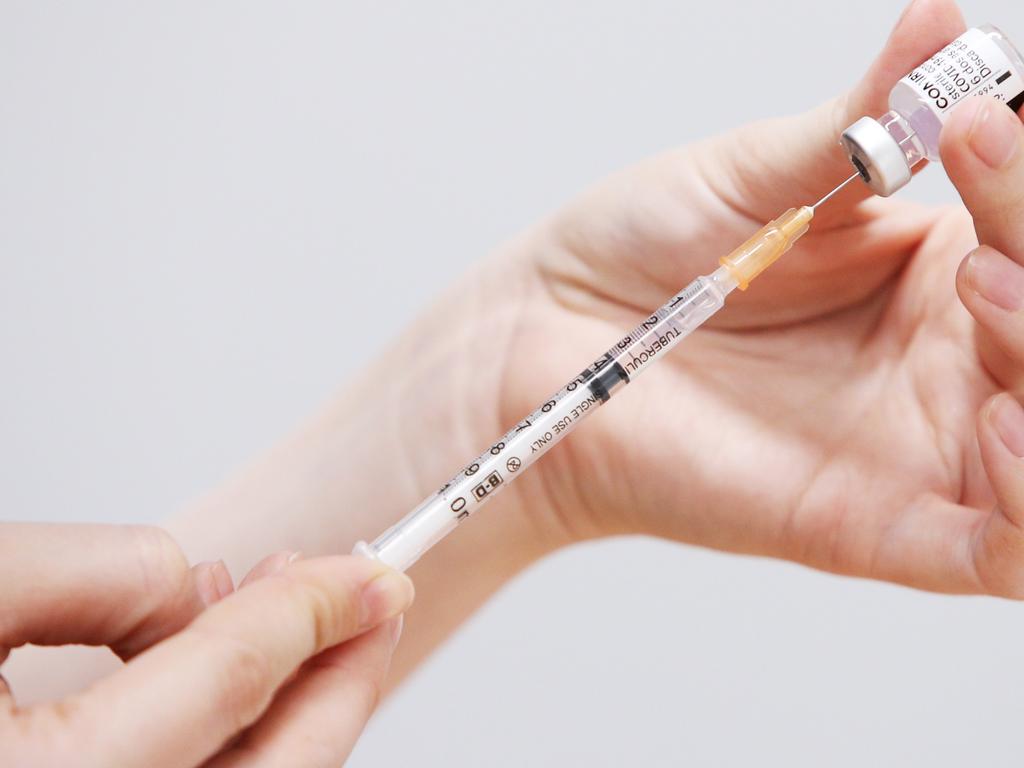
How rare is TTS?
TTS is very rare, only one in every 65,000 people who get the AstraZeneca jab will develop the condition.
Every day 50 Australians develop blood clots that are not related to vaccination and there is an almost one in 12 risk of developing a blood clot at some stage throughout life.
You are much less likely to get TTS from the jab than you are to get a blood clot from the contraceptive pill where the risk is one in every 1000.
Many every day medicines are killers but we give barely a thought to using them.
Paracetamol for example killed over 200 people in the ten years between 2007 and 2017.
One of the most commonly used prescription medicines in Australia — atorvatstain — has been linked to 13 deaths.
The chance of being killed on the roads is five times higher than getting a blood clot from AstraZeneca’s vaccine.
Why then have experts suggested it’s safer for people aged under 60 to have the Pfizer vaccine?
The risk of TTS syndrome reduces with age.
. under 50 the risk is 3.1 in 100,000,
.50-59 the risk is 2.7 in 100,000
.60-69 the risk is 1.4 in 100,000
.70-79 the risk is 1.8 per 100,000
.80 plus the risk is 1.8 per 100,000.
On the other hand, the risk of dying or getting severely ill from Covid increases with age.
“For example, if you’re 70, you’re three to six times more likely to be hospitalised with Covid than if you’re 30, you’re up to 10 times more likely to go to ICU and you’re many fold times more likely to die of Covid, compared to a 30 year old,” the co-chair of the government’s expert vaccine advisory committee Associate Professor Chris Blythe said.
This is the reason experts picked 60 as the threshold age at which the risk of the blood clots was outweighed by the risk of death or severe disease.
“A statistic that’s quite sobering is the fact that 99.5 per cent of all deaths in Australia, from Covid have been in the over 50s even though the main age that has got Covid are those aged 20 to 29,” Professor Skerritt said.
Should you be worried about the blood clots?
The reason we’re having COVID-19 vaccines is to save lives so a vaccine side effect that actually takes lives is a risk that has to be taken seriously.
That’s why our medicines watchdog the Therapeutic Goods Administration (TGA) has said the Pfizer vaccine, which does not have a blood clot risk, is the preferred vaccine for people aged under 60.
“We want people to know that if this does occur, they should present and get treatment and by alerting people that means that we may be detecting milder cases,” the co-chair of the government’s vaccine advisory body Associate Professor Chris Blythe said.
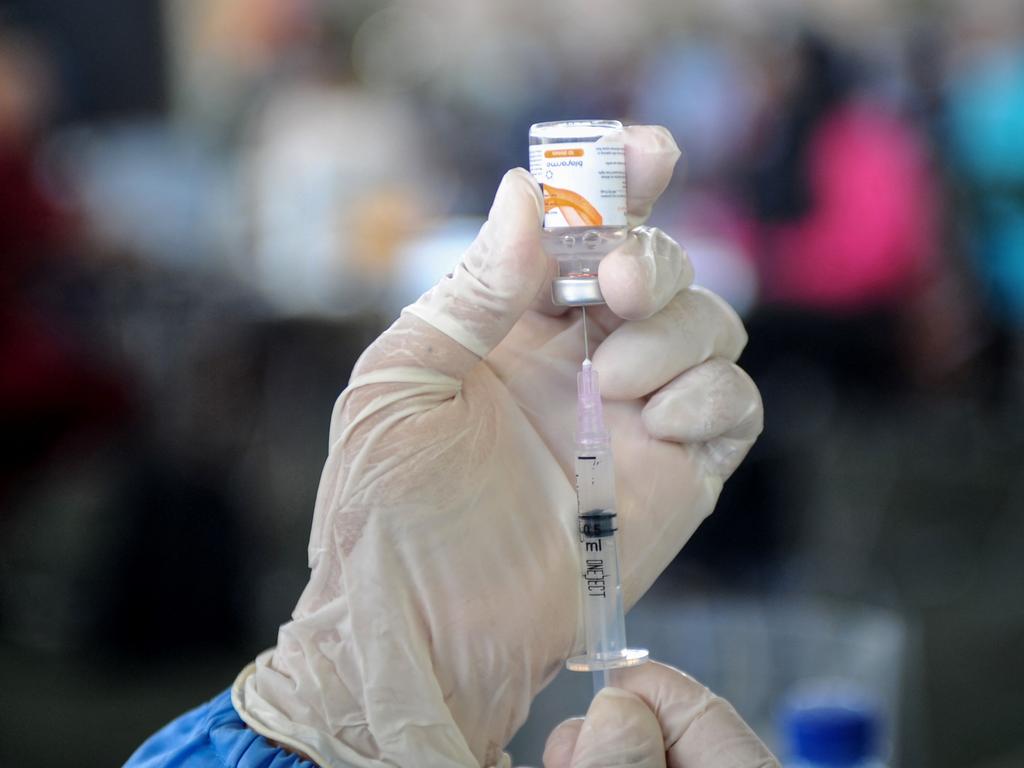
What are the tests for TTS?
If you think you may have a TTS blood clot doctors order a blood test for a specific protein that’s produced by the body to break down clots called D dimer.
They will also test for anti-PF4 antibodies that activate platelets, they will also check the condition is not linked to your use of the blood thinning drug heparin given to most Australians if they are undergoing surgery.
Originally published as AstraZeneca vaccine change for Delta outbreak


